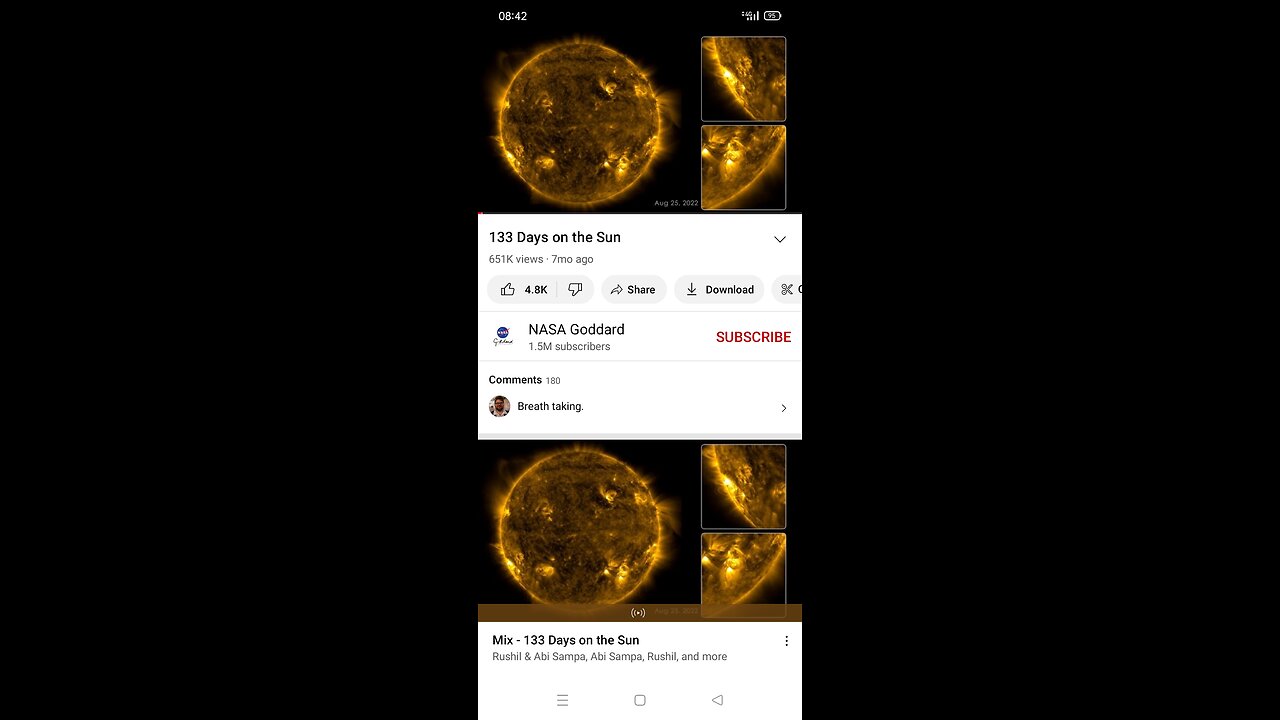Premium Only Content

Nasa | 133 days On sun
This video chronicles solar activity from Aug. 12 to
Dec. 22, 2022, as captured by NASA's Solar Dynamics
Observatory (SDO). From its orbit in space around
Earth, SD0 has steadily imaged the Sun in 4K x 4K
resolution for nearly 13 years. This information has
enabled countless new discoveries about the
workings of our closest star and how it influences the
solar system.
With a triad of instruments, SD0 captures an image of
the Sun every 0.75 seconds. The Atmospheric
Imaging Assembly (AIA) instrument alone captures
images every 12 seconds at 10 different wavelengths
of light. This 133-day time lapse showcases photos
taken at a wavelength of 17.1 nanometers, which is an
extreme-ultraviolet wavelength that shows the Sun's
outermost atmospheric layer: the corona. Compiling
images taken 108 seconds apart, the movie
condenses 133 days, or about four months, of solar
observations into 59 minutes. The video showS bright
active regions passing across the face of the Sun as it
rotates. The Sun rotates approximately once every 27
days. The loops extending above the bright regions
are magnetic fields that have trapped hot, glowing plasma. These bright regions are also the source of
solar flares, which appear as bright flashes as
magnetic fields snap together in a process called
magnetic reconnection.
While SDO has kept an unblinking eye pointed toward
the Sun, there have beena few moments it missed.
Some of the dark frames in the video are caused by
Earth or the Moon eclipsing SDO as they pass
between the spacecraft and the Sun. Other blackouts
are caused by instrumentation being down or data
errors. SDO transmits 1.4 terabytes of data to the
ground every day. The images where the Sun is
off-center were observed when SDO was calibrating
its instruments.
SDO and other NASA missions will continue to watch
our Sun in the years to come, providing further
insights about our place in space and information to
keep our astronauts and assets safe.
The music is a continuous mix from Lars Leonhard's
"Geometric Shapes" album, courtesy of the artist.
Credit: NASA's Goddard Snace Fliaht Center
Video Description:
On the left side of the frame is the full circle of the
Sun. It appears in a golden yellow color, but splotchy
and with thin yellow wisps extending from the surface.
Some areas are very bright and others almost black.
The whole Sun rotates steadily, with one full rotation
taking 12 minutes in this time lapse. There are usually
only a few bright regions visible at a time and they
shift and flash like small fires. From these regions
there are wispy loops reaching up above the surface
that rapidly change shape and size.
On the right side of the frame are two white-outlined
squares with enlargements of interesting regions of
the Sun.
If you liked this video, subscribe to the NASA Goddard
Video Description:
On the left side of the frame is the full circle of the
Sun. It appears in a golden yellow color, but splotchy
and with thin yellow wisps extending from the surface.
Some areas are very bright and others almost black.
The whole Sun rotates steadily, with one full rotation
taking 12 minutes in this time lapse. There are usually
only a few bright regions visible at a time and they
shift and flash like small fires. From these regions
there are wispy loops reaching up above the surface
that rapidly change shape and size.
On the right side of the frame are two white-outlined
squares with enlargements of interesting regions of
the Sun.
If you liked this video, subscribe to the NASA Goddard
Video Description:
On the left side of the frame is the full circle of the
Sun. It appears in a golden yellow color, but splotchy
and with thin yellow wisps extending from the surface.
Some areas are very bright and others almost black.
The whole Sun rotates steadily, with one full rotation
taking 12 minutes in this time lapse. There are usually
only a few bright regions visible at a time and they
shift and flash like small fires. From these regions
there are wispy loops reaching up above the surface
that rapidly change shape and size.
On the right side of the frame are two white-outlined
squares with enlargements of interesting regions of
the Sun.
If you liked this video, subscribe to the NASA Goddard
YouTube channel: / nasagoddard
-
 2:04:52
2:04:52
Kim Iversen
14 hours agoElon's Pumping Out Babies Like They're Tesla Model 3's | EU Panics Over Peace Talks, Wants More War
168K159 -
 1:05:35
1:05:35
Man in America
16 hours agoFort Knox & Trump’s Secret Gold Move—The Financial Reset NO ONE Is Ready For?
119K133 -
 2:21:20
2:21:20
Robert Gouveia
13 hours agoTrump Goes to SCOTUS! Judge CAVES on DOGE? Fani Willis Not Happy!
127K32 -
 20:41
20:41
Stephen Gardner
13 hours ago🔥You Won't BELIEVE What JUST Happened To Don Trump Jr.!!
134K215 -
 58:00
58:00
The StoneZONE with Roger Stone
11 hours agoEuropean Leaders Resist Trump Peace Overtures To Their Own Demise | The StoneZONE w/ Roger Stone
95.8K12 -
 9:29
9:29
AlaskanBallistics
13 hours ago $12.11 earnedWyoming Suppressors and Rifles at Shot Show 2025
113K6 -
 1:06:40
1:06:40
Donald Trump Jr.
17 hours agoThe Left is Taking one L After Another, Live with Michael Knowles | Triggered Ep. 217
201K152 -
 47:17
47:17
Kimberly Guilfoyle
17 hours agoWoke Gets DOGE’d, Live with AJ Rice & Jarrett Stepman | Ep. 197
145K45 -
 20:11
20:11
Candace Show Podcast
15 hours agoBecoming Brigitte: Candace Owens x Xavier Poussard | Ep 6
218K375 -
 8:25:38
8:25:38
Dr Disrespect
20 hours ago🔴LIVE - DR DISRESPECT - ELDEN RING DLC - REVENGE
207K22